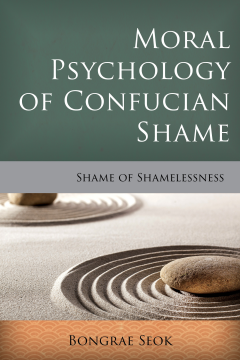
Additional Information
Book Details
Abstract
Early Confucian philosophers (notably Confucius and Mencius) emphasized moral significance of shame in self-cultivation and learning. In their discussion, shame is not just a painful sense of moral failure or transgression but also a moral disposition and a form of moral excellence (i.e., virtue) that is essential to Confucian self-cultivation.
In Moral Psychology of Confucian Shame, Bongrae Seok argues that shame is a genuine moral emotion and moral disposition.
Engaging with recent studies of social psychology, cultural psychology, biology, and anthropology, Seok explains that shame is a uniquely evolved form of moral emotion that is comparable to, but not identical with, guilt. The author goes on to develop an interpretation of Confucian shame that reveals the embodied, interactive, and transformative nature of the Confucian moral self.
Bongrae Seok’s The Moral Psychology of Confucian Shame is a rigorous and insightful investigation of Confucian moral psychology and the significance of shame as a self-critical emotion. It offers a thought-provoking and nuanced alternative to conventional Western conceptions of shame and it will be an indispensable contribution to the study of moral psychology and East Asian and intercultural philosophy.
Eric S. Nelson, Associate Professor of Humanities, Hong Kong University of Science and Technology
An expert in moral psychology, Confucian tradition, and moral philosophy, Bongrae Seok presents us with a study of Confucian conception of moral shame that is empirically supported, textually grounded, and philosophically innovative. Shame here is treated not as a passive, negative, and destructive feeling, reflecting one’s moral failure, but as an active, positive, and constructive virtue, indicating one’s never-ending moral improvement.
Huang Yong, The Chinese University of Hong Kong
Bongrae Seok is Associate Professor of Philosophy at Alvernia University, USA. He is the author of Embodied Moral Psychology and Confucian Philosophy (2013).
Bongrae Seok takes the neglected virtue of shame--so common in the Confucian tradition and yet commonly undervalued and even denigrated in Western moral psychology--and argues convincingly for a new appreciation of it. In a wide-ranging and yet nuanced argument, Seok methodically engages the literature of evolutionary psychology, Ancient Greek moral theory, current experimental and clinical psychology, current philosophical moral psychology, and most importantly, early Confucian theories of ethics and self-cultivation. His conclusion is that shame is a rich, multi-dimensional ethical emotion that deserves more attention from philosophers and psychologists. One begins to wonder from his analysis if shame may be a necessary component of any complete system of moral competence. In his ability to deftly handle a diversity of sources with insight and acumen, Seok has few peers.
Brian Bruya, Ph.D., Professor of Philosophy at Eastern Michigan University and editor of The Philosophical Challenge from China
Table of Contents
| Section Title | Page | Action | Price |
|---|---|---|---|
| _GoBack | xx | ||
| _GoBack | 1 | ||
| _GoBack | 57 | ||
| _GoBack | 167 | ||
| _GoBack | 185 | ||
| _GoBack | 187 | ||
| _GoBack | 193 |
